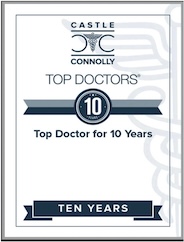Constipation—When You May Need More than Fiber and Fluids
04/04/2016
By Joseph Gauta, MD, FACOG
Discussing your bowel movements with friends around the dinner table should not be normal conversation. Unfortunately, it is all too common in some of our daily routines. Constipation means having a bowel movement less than every other day (or less than 3 times a week). It is very common, affecting about 1 in 3 women.
Everyone is different, but normally you should have a bowel movement at least every other day and no more than twice daily. Infrequent bowel movements can lead to symptoms of pain and bleeding with bowel movements. Some women with constipation find it helpful to press on the perineum (the area between the vagina and the anus) or on the back wall of the vagina to help get all of the bowel movement out. Symptoms of constipation include:
. Abdominal discomfort
. Gas
. Bloating
. Straining
. Hard/firm stool
Am I at Risk?
Constipation occurs for several reasons. It may be related to diet choices, medicines, or health problems. Straining on the toilet with constipation can lead to pelvic dysfunction and prolapse or it can be the effect of pelvic floor dysfunction. Learn your risk and what you can do to reduce episodes of constipation. Do it for the health of your pelvic floor!
Dietary Problems
The most common reason for constipation is not having enough fiber in your diet. This is very common in women who eat a typical American diet, and getting enough fiber to fix this problem often requires planning and supplementation. Some foods, especially those high in starch such as white rice, pasta, or white bread, are more likely to lead to constipation. Constipation may also be due to lack of fluids in your diet. Some women do not drink enough fluids to keep their stool soft. When there is not enough fiber or water in your diet, bowel movements are more likely to be hard or irregular.
Medicines
Many medications cause constipation as a side effect. Talk with your doctor about the side effects of your medicines. Ask about alternative medicines without constipating effects. Common constipating medications include:
• Iron and calcium supplements.
• Narcotic pain medications
• Anticholinergic medications
• Antidepressants
• Blood pressure medicines
Pelvic Floor Disorders
Rectoceles and other forms of prolapse can sometimes lead to problems with bowel movements. Women who are unable to relax the pelvic floor muscles due to pain can also have problems passing bowel movements. In turn, chronic constipation can cause pelvic floor disorders.
Medical Conditions
Constipation can result from abnormal nerve or muscle function causing severe irregularity. Constipation can occur by itself or from certain medical conditions, which cause irregularity and/or hard stools such as:
• Irritable bowel syndrome.
• Inflammatory bowel disease.
• Thyroid disorders
• Cystitis fibrosis
• Neurological conditions such as multiple sclerosis or spinal cord injuries
Intestinal Blockage
Rarely, the cause of constipation is a blockage from colon cancer, other tumors, or scar tissue from prior infections or surgeries. In this case, the constipation usually continues to get worse until the problem is treated. Women with this problem also may notice they are not passing gas and that they feel bloated.
If simple over the counter remedies and dietary changes are not enough, you may need to see a specialist.
Sources: Original publication date: May 2008; Content Update: November 2014
Call 239-449-7979 or Contact Us today!
It's time to start living your life to the fullest. Regain control of your life.










